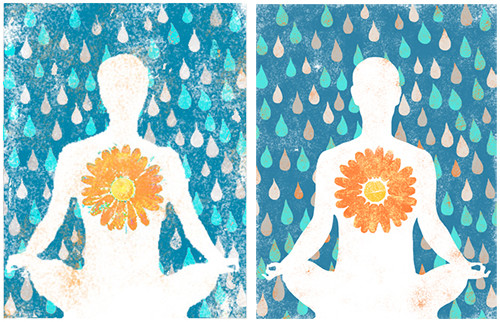It’s no secret: Life is full of 10,000 joys and 10,000 sorrows, and the brain is wired in a way where the sorrows are stickier than the joys. This wiring has been reinforced by the need to survive — we learn to pay quicker and more focused attention to the potential threats that have come our way in the past. After all, we’re wired to survive, not be happy. But that doesn’t mean a more enduring core sense of well-being isn’t possible.
In Uncovering Happiness: Overcoming Depression with Mindfulness and Self-Compassion, I explore the science and practice behind a host of natural anti-depressants (resiliency factors) that we can release in order to gain a sense of inner confidence and a core deep happiness. We can begin to experience happiness no matter what comes our way. We can be grateful for the good moments and more graceful during the inevitable difficult moments.
One key to overcoming this negativity bias and uncovering happiness is learning to recognize and gain space from the self-critical mind. We can learn to encourage the positive beliefs about ourselves that the critical mind has buried.
Four simple questions can open us up and encourage our positive beliefs in ourselves. These queries can also instill positive neuroplasticity in the brain. In doing this, we can become more confident in ourselves and ultimately more resilient (and definitely happier).
4 Questions for Uncovering Happiness
From time to time, you might notice a nourishing thought arise, such as “I’m good enough,” “Life is fine as it is,” “I’m worthy of love,” or “What a beautiful moment.” Be on the lookout for these thoughts. When you notice them, fan the flame as you play with the following four questions:
- “Is it true?” Because of the strength of our inner critics, our minds are often quick to dismiss positive thoughts. You may notice a quick reaction of “No, it’s not true. I’m not really beautiful, worthy of love, good enough…” and so on.
- “Is it possible that it’s true?” Here is where we open the door a bit and ask if there is any possibility that it’s true, no matter how small our minds may say it is. The answer inevitably here is, “Yes, I guess there is a possibility.”
- “If you step into that possibility for a moment, how does that make you feel?” Two things can happen here. You may find that fear arises — the fear of the unknown. This can be an opportunity for self-compassion. What would life be like if I stepped into this light? It reminds me of a poem by spiritual author and lecturer Marianne Williamson that starts, “Our greatest fear is not that we are inadequate. Our deepest fear is that we are powerful beyond measure.” Remind yourself that it doesn’t serve you or the world to be in your small self. However, this inquiry may also allow you to experience a positive emotion such as joy, contentment, or confidence.
- “Can I allow myself to linger in this feeling for a few moments?” When we allow ourselves to savor what’s good, our “good-feeling” neurons fire together. As psychologist Donald Hebb memorably put it, “Neurons that fire together, wire together.” And that promotes resiliency in the future.
What would the days, weeks, and months ahead be like if you were more open to this possibility? Try this on right now with any potential positive belief about yourself and see what you notice.
The fact is, the belief we have in our negative thinking is one of our worst habits as a human species and oftentimes doesn’t serve us. The positive belief in ourselves could go a long way, and my hope is that Uncovering Happiness can help awaken what I call our “natural anti-depressants.” We can learn to inspire the hope that having had emotional struggles in the past doesn’t mean we need to suffer from them in the same way in the future. There are specific seeds within each and every one of us that if we understand and water, we can literally create a more resilient and joyful life.
As always, please share your thoughts, stories, and questions below. Your interaction creates a living wisdom from which we all benefit.



This Post Has One Comment
Elisha, (quite honestly) I rarely, if EVER, read blogs, etc. But having (quite literally) just *chanced upon it/this, (*I was merely checking on the LT holiday hours guide), I found your annotation/belief(s)/theories, seemed to have ‘sparked a nerve’ of interest w/in me. I am, however, ALWAYS quite the bookworm & read A LOT of different literature; fiction/non-fiction, self help, philosophy, etc., but I found this (particular) blog was/is ‘simply stated’; (you) explained the concept sensibly & in an unadorned way; short & succinctly. Bottom line is that I found it easily understood; ANYONE would/could grasp its meaning—& QUICKLY; ‘4 Simple Questions’ succinctly describe your thoughts. Okay, so having said all of THAT — what I’m (simply 🙄) saying is that THIS is great ‘food for thought’ & w/only 4 simple steps/elucidated, (again, in simple form), for ANYONE to grasp—people are far too busy to sit & read books or even a elongated version of ANYTHING, **myself included (**sometimes, anyway)…which is unfortunate but true 😕 So, thank you for posting this—& please do keep posting more of your thoughts w/regard to this or ANY OTHER topic(s) too! I’ll be looking forward to them! Cheers! -SG